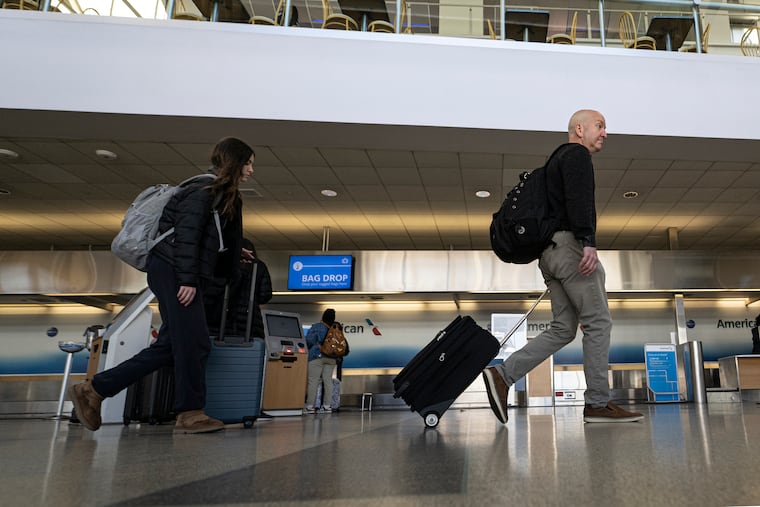Easier cash refunds, more clarity around bag fees: What to know about the new airline rules
The new regulations could save you "a lot of hassle" on your next flight out of Philly, consumer advocates say.

Every time Christina McGill books a flight, she methodically compares prices, using Google Flights and Hopper and accounting for the extra baggage fees that vary by airline.
McGill, who flies three or four times a year, welcomes the new federal regulations announced last week that will require airlines and travel agents, including online services, to be more transparent about extra fees.
“I hate having to do the math myself,” said McGill, a 31-year-old marketing manager who lives in South Philadelphia. “I’m so excited for this.”
For airline passengers, including the 28.1 million who pass through the Philadelphia International Airport annually, the new regulations around cancellations and delays “will save people a lot of hassle if there is a problem,” said Teresa Murray, the consumer watchdog director for the U.S. Public Interest Research Group (PIRG). Meanwhile, the fee transparency “will help people be able to compare apples to apples.”
What to know about new airline rules
The new rules will give McGill peace of mind, she said, if a flight is canceled or if there’s a significant delay. The regulations strengthen existing laws that require airlines to automatically offer a cash refund that includes extra fees. They also define a significant delay — which also prompts a refund — as a flight delayed by three hours domestically or six hours internationally.
The refund rule is expected to take effect first, in about six months, said Murray, who was briefed by Department of Transportation officials last week.
The refund policy will be implemented based on the date of booking, not the date of the flight, she said — meaning if this summer you book a flight for next winter, the new regulations may not apply.
After the rule takes effect, passengers who opt for a cash refund should get one within seven business days if they paid by credit card, and within 20 calendar days if they paid with another method. (One of a myriad of reasons consumers are most protected if they make large purchases with credit cards, Murray added.)
And while cash refunds, not just a flight voucher, must be offered, customers who want to get on another flight instead should expect more help from airlines’ customer service, Murray said.
“What the Department of Transportations signaled is they are expecting these airlines to step up and work with people to make them happy,” Murray said.
According to examples provided by officials at the briefing, if a flight is canceled or significantly delayed last minute, the airline may now contact you proactively and offer you other options, Murray said. For consumers, she added, that means making sure you are checking on your flight status in the days ahead of your trip and ensuring the airline has good contact information for you.
Airlines that receive consumer complaints through the Department of Transportation website, Flightrights.gov, could be subject to fines.
“It’s going to make it more important for passengers to know that they have rights,” Murray said. “They don’t need to have them all memorized … you just have to know that you have rights.”
Potential for consumer harm?
The airline industry and some Republican lawmakers say consumers will ultimately pay for these changes.
“We’re witnessing one of the most activist and interventionist Departments of Transportation,” said Kenneth Quinn, a partner at Clyde & Co. and former chief counsel of the U.S. Federal Aviation Administration during George H.W. Bush’s administration from 1991 to 1993. Judging by airlines’ recent financial results, “they are surviving and not necessarily thriving with margins and profitability that cannot just absorb a bottom line of huge new costs associated with consumer protection rules.”
“Unquestionably there are going to be significant costs that are going to be passed along to consumers, who have been able to enjoy competitive pricing,” he added.
Airlines for America, which lobbies for major U.S. airlines, said airlines already meet or exceed customer expectations, with refund complaints having dropped since mid-2020 and the country’s 11 largest carriers having issued $43 billion in refunds from 2020 through 2023.
The costs of flying
In 2022 and 2023, as demand for travel soared and inflation spiked, consumers saw a steep rise in the cost of airfare. These prices have fallen in recent months, though there is little consensus from experts on whether this trend will continue.
While airfare on average may be down relative to a year ago, extra fees, including for baggage and seat selection, are higher, with airlines citing inflated operating costs.
In the first two months of the year, Alaska Airlines, JetBlue, American, United, and Delta all quietly raised their checked-bag fees by $5 to $10, so a passenger’s first checked bag now costs $35 to $45.
“The fees definitely add up,” said Kelly Palmer, a 32-year-old nurse living in Fishtown. In some situations, the price of a “budget airline can become more similar to a nonbudget airline price if you bring a bag.”
And even Quinn, the former FAA counsel opposed to the refund rule, said he welcomes more transparency around these fees.
“It’s very helpful for consumers to see a total, all-in cost when traveling to a particular destination on one airline compared to another,” he said.
This article contains information from the Associated Press.